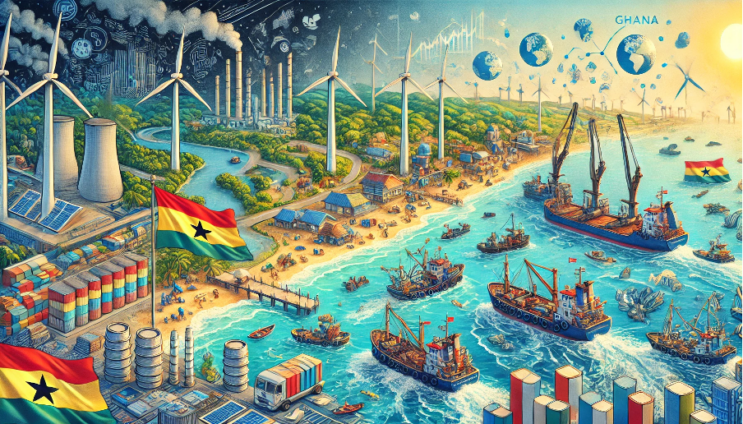
Audio By Carbonatix
Ghana stands at a crossroads, grappling with a confluence of economic challenges that require bold and innovative solutions. Rising public debt, which reached 71% of GDP in 2023, a persistent energy crisis that impacts industrial productivity, and the depreciating cedi have created an environment of uncertainty for businesses and households alike.
While traditional remedies, including reliance on loans from global institutions like the IMF and World Bank, have provided short-term relief, they often come with restrictive conditions that constrain policy flexibility and limit the nation’s ability to address underlying structural issues. Ghana must now look beyond conventional approaches to navigate this period of economic turbulence and emerge stronger and more resilient.
Ocean finance offers a beacon of hope within this context. Defined as the strategic mobilisation of financial resources to support sustainable ocean management and development, ocean finance taps into the vast and largely underutilized potential of Ghana’s Blue Economy. Globally, the Blue Economy contributes an estimated $3 trillion annually and supports over 150 million jobs, spanning sectors such as fisheries, renewable energy, maritime logistics, and coastal tourism (World Bank, 2022). Ghana’s 550-kilometre coastline and its exclusive economic zone, covering 225,000 square kilometres, position the country to benefit significantly from these opportunities.
Ghana’s launch of its Blue Economy initiative was a critical step in recognizing the economic value of its marine resources. However, the integration of ocean finance into the country’s economic recovery strategy remains limited. Success stories from nations like Seychelles and Norway illustrate how innovative financial mechanisms, such as blue bonds and marine wealth management frameworks, can turn the tide. Seychelles, for instance, issued a $15 million blue bond to fund sustainable fisheries and marine conservation, while Norway’s investment in aquaculture and marine research generates over $94 billion annually (Norwegian Directorate of Fisheries, 2023; Seychelles Ministry of Finance, 2023).
Creating a robust ocean financing framework tailored to Ghana’s unique challenges and opportunities is imperative. This framework must address the immediate economic pressures of rising debt, energy deficits, and currency depreciation while laying the foundation for long-term sustainability. In leveraging innovative financial instruments, fostering public-private partnerships, and integrating ocean finance into national economic policies, Ghana can unlock the full potential of its Blue Economy.
This article explores how Ghana can navigate its economic crisis through ocean finance. It begins by examining the scope and economic opportunities of ocean finance, followed by lessons from global leaders, an analysis of Ghana’s unique challenges and opportunities, and a roadmap for building an effective ocean financing framework. Finally, it provides actionable recommendations to ensure Ghana’s Blue Economy becomes a cornerstone of economic recovery and resilience.
The Case for Ocean Finance
Ocean finance represents a powerful and underutilized tool for addressing Ghana’s pressing economic challenges. Defined as the strategic mobilization of financial resources to support sustainable ocean management and development, ocean finance provides a pathway to harness the economic potential of marine and coastal resources while promoting environmental sustainability. In a period of rising debt, energy crises, and a depreciating cedi, ocean finance offers a transformative solution to drive economic recovery and resilience.
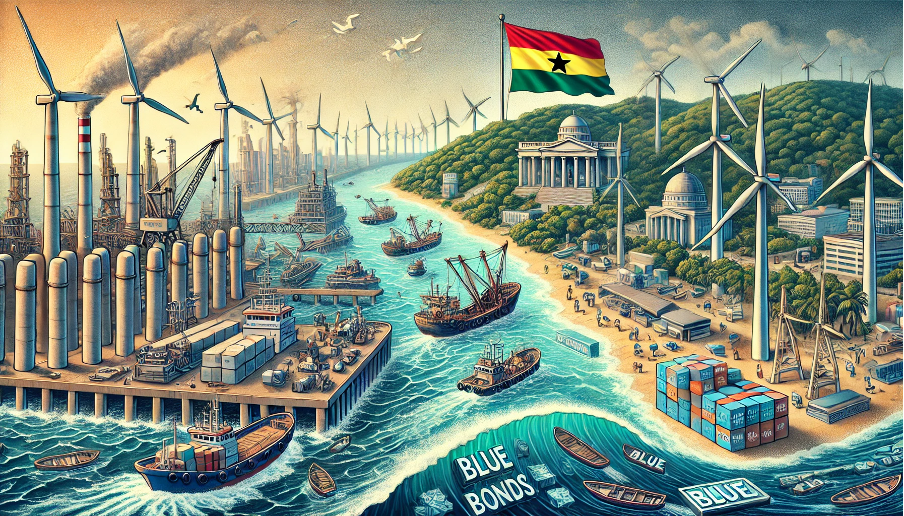
Ghana’s maritime sector, rich in resources and opportunities, remains significantly underutilized. The fisheries industry, which provides livelihoods for over 2 million Ghanaians, suffers from illegal, unreported, and unregulated (IUU) fishing, costing the economy approximately $50 million annually (CIMAG, 2023). Sustainable fisheries management supported by ocean finance could restore fish stocks, increase economic output, and enhance food security.
Renewable energy is another untapped opportunity within Ghana’s Blue Economy. Offshore wind and wave energy projects have the potential to diversify the country’s energy mix, reduce reliance on fossil fuels, and alleviate the ongoing energy crisis. Globally, offshore wind energy has become a lucrative industry, with Denmark generating $10 billion annually and providing nearly half of its electricity through this renewable resource (Danish Energy Agency, 2023). Ghana’s coastal winds offer similar potential, which could be unlocked with the right financial and policy support.
Coastal tourism, despite Ghana’s natural and cultural heritage, remains underdeveloped. Iconic regions like Cape Three Points and Nzulezu have the potential to attract significant international tourism revenue. Kenya’s marine tourism industry, supported by marine protected areas (MPAs), contributes over $1 billion annually to the country’s economy (Kenya Marine and Fisheries Research Institute, 2023). Through investing in sustainable tourism infrastructure and promoting eco-tourism, Ghana can generate employment and revenue while conserving its coastal ecosystems.
The maritime logistics sector also presents a strategic opportunity for Ghana. With ports like Tema and Takoradi serving as gateways for regional trade, the country is well-positioned to expand its role in global maritime logistics. Investments in port modernization and improved logistics infrastructure, supported by ocean finance, could replicate the success of global hubs like Singapore, where the maritime industry generates over $100 billion annually (Singapore Maritime and Port Authority, 2023).
However, the underutilization of these opportunities highlights significant economic implications. Ghana’s failure to fully tap into its Blue Economy has left critical revenue streams unrealized and potential jobs uncreated. Ocean finance, when aligned with innovative financial instruments such as blue bonds, carbon credits, and public-private partnerships, can bridge this gap. For instance, Seychelles’ blue bond initiative raised $15 million to fund sustainable fisheries and marine conservation, providing both environmental and economic returns (Seychelles Ministry of Finance, 2023). Ghana can emulate such initiatives to finance its Blue Economy projects while fostering sustainability.
Beyond its economic benefits, ocean finance offers a pathway for addressing Ghana’s environmental challenges. Investments in marine conservation, renewable energy, and sustainable aquaculture can mitigate the impacts of climate change, protect biodiversity, and reduce pollution. These actions not only enhance environmental resilience but also attract international funding and partnerships.
Global Lessons in Ocean Finance Countries around the world have demonstrated how ocean finance can transform their economies while fostering environmental sustainability. These success stories provide Ghana with valuable insights into how strategic investments and innovative financial instruments can be leveraged to unlock the potential of its Blue Economy. From Seychelles’ pioneering blue bonds to Norway’s sustainable marine wealth management, these examples highlight key components of effective ocean financing frameworks
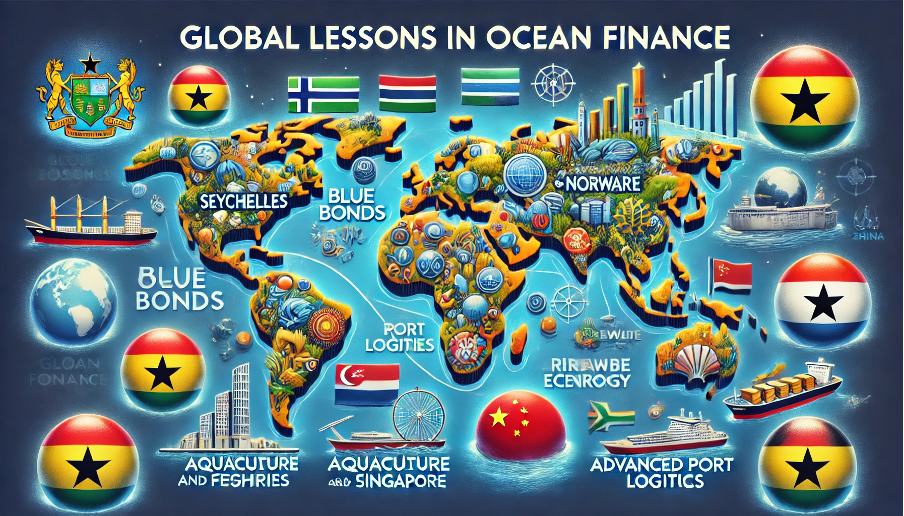
- Seychelles: Pioneering Blue Bonds for Marine Conservation
Seychelles set a global precedent with the issuance of its $15 million blue bond in 2018. This innovative financial instrument was designed to support marine conservation and sustainable fisheries, directly addressing the environmental degradation caused by overfishing. Through channelling the proceeds into projects that protect marine biodiversity and promote sustainable practices, Seychelles has achieved significant milestones, including the designation of 30% of its marine areas as protected zones. This initiative has not only preserved the country’s biodiversity but also boosted eco-tourism, a sector that contributes over 65% of Seychelles’ GDP (Seychelles Ministry of Finance, 2023). Ghana can adopt a similar approach, using blue bonds to finance critical marine conservation projects while generating economic returns.
- Norway: Maximizing Marine Wealth Through Sustainable Fisheries
Norway is a global leader in ocean finance, generating over $94 billion annually from its marine sectors (Norwegian Directorate of Fisheries, 2023). This success is rooted in a sustainable fisheries management model supported by robust funding mechanisms and cutting-edge technology. Public-private partnerships (PPPs) play a pivotal role in Norway’s marine economy, with the seafood industry collaborating with the government to ensure responsible resource utilization. Aquaculture, a key pillar of Norway’s Blue Economy, contributes $9.2 billion annually and supports thousands of jobs. Ghana, with its vast fisheries and aquaculture potential, can draw lessons from Norway’s model by fostering PPPs and investing in technology-driven fisheries management.
- Singapore: Building a Global Maritime Hub
Singapore’s maritime industry serves as a blueprint for how strategic investments in port infrastructure and logistics can drive economic growth. The Maritime and Port Authority of Singapore oversees a highly efficient logistics network that connects the country to global trade routes. This strategic positioning generates over $100 billion annually, contributing significantly to Singapore’s GDP (Singapore Maritime and Port Authority, 2023). Ghana, with its strategic location along major shipping routes, can replicate Singapore’s success by modernizing its ports and integrating advanced technologies like blockchain for supply chain transparency.
- China: Expanding Renewable Energy and Coastal Development
China’s investment in offshore wind energy has propelled it to the forefront of renewable energy innovation. As the world’s largest offshore wind producer, China generated 27 gigawatts of electricity in 2022, contributing to significant reductions in carbon emissions and energy costs (International Energy Agency, 2023). Coastal development projects have also integrated eco-tourism and aquaculture, creating diversified revenue streams. Ghana’s coastal winds and marine ecosystems offer similar opportunities for renewable energy and integrated coastal development, provided that ocean finance mechanisms are strategically implemented.
- United States: Advancing Ocean Technology and Research
The United States has leveraged ocean finance to support technological innovation and research. The National Oceanic and Atmospheric Administration (NOAA) invests billions annually in marine science and technology, driving advancements in ecosystem monitoring, renewable energy, and disaster resilience. Public-private partnerships have enabled the U.S. to lead in marine technology development, with significant contributions from companies such as Microsoft and Google. Ghana can follow this model by establishing research and development (R&D) centres that integrate local expertise with global partnerships to enhance its Blue Economy.
- Lessons for Ghana: Key Components of Successful Ocean Finance
Lessons from successful global models of ocean finance offer invaluable insights for Ghana as it seeks to navigate its economic challenges and unlock the potential of its Blue Economy. Public-private partnerships (PPPs) have been particularly effective in mobilizing resources and expertise through shared responsibility. Countries like Norway and Singapore have leveraged PPPs to drive sustainable fisheries management and create world-class port logistics systems, respectively. These collaborations highlight the importance of involving both government and private stakeholders in achieving long-term sustainability and economic growth.
Innovative financial instruments such as blue bonds, carbon credits, and ecosystem service payments have demonstrated their ability to generate significant economic returns while fostering sustainability. Seychelles’ blue bond initiative, for example, has financed marine conservation and sustainable fisheries, providing a model that Ghana can adapt to fund its marine projects and boost its environmental resilience.
Investments in technology and research and development (R&D) are also crucial. Advanced technologies like artificial intelligence, blockchain, and remote sensing have transformed ocean management in countries such as the United States and Norway. In establishing R&D centres, Ghana can enhance its ability to monitor and manage marine resources, create data-driven policies, and attract international partnerships to support its Blue Economy initiatives.
Renewable energy represents another critical opportunity for Ghana. Offshore wind and wave energy projects, as seen in Denmark and China, have diversified energy portfolios, reduced dependence on fossil fuels, and contributed significantly to economic growth. Ghana’s coastal winds and ocean currents offer similar potential, which can be unlocked through targeted investments and strategic policy interventions.
Finally, marine conservation and eco-tourism have shown tremendous economic and environmental benefits in countries like Seychelles and Kenya. Protecting marine ecosystems and promoting sustainable tourism not only preserves biodiversity but also creates jobs and generates revenue. Ghana’s rich natural and cultural heritage positions it uniquely to develop a thriving eco-tourism industry while ensuring the protection of its coastal and marine environments.
Ocean Finance in Ghana: Opportunities and Challenges
Ghana’s vast maritime resources offer a wealth of opportunities for economic growth and environmental sustainability. With a 550-kilometre coastline and an exclusive economic zone spanning 225,000 square kilometres, the country possesses significant potential in sectors such as fisheries, renewable energy, maritime logistics, and coastal tourism. However, despite these abundant resources, Ghana’s Blue Economy remains largely underdeveloped, hindered by funding gaps, governance issues, and capacity constraints.
One of the most promising opportunities lies in the fisheries sector, which directly supports over two million livelihoods. However, the industry is plagued by illegal, unreported, and unregulated (IUU) fishing, costing Ghana an estimated $50 million annually (CIMAG, 2023). Addressing this issue through sustainable fisheries management could significantly boost the sector’s contributions to GDP and enhance food security. Ocean finance mechanisms such as blue bonds and grants from the Eco-6 Stimulus Fund could provide the necessary resources for enforcement technologies and community-based initiatives to combat IUU fishing.
The renewable energy sector also holds immense promise. Coastal winds and ocean currents along Ghana’s shoreline offer ideal conditions for offshore wind and wave energy projects. Through investing in marine renewable energy infrastructure, Ghana can diversify its energy mix, reduce dependence on fossil fuels, and mitigate its ongoing energy crisis. The successes of Denmark and China in leveraging ocean finance to drive renewable energy development provide valuable lessons that Ghana can adapt to its context.
Maritime logistics presents another strategic opportunity. Ghana’s ports in Tema and Takoradi are critical gateways for regional and international trade. However, outdated infrastructure and inefficiencies limit their capacity to compete with global maritime hubs like Singapore and Dubai. Investments in port modernization, supported by innovative financial instruments such as public-private partnerships, could position Ghana as a regional leader in maritime logistics, generating significant revenue and creating jobs.
Coastal tourism is an underutilized asset in Ghana’s Blue Economy. Iconic sites such as Cape Three Points and Nzulezu offer unique eco-tourism experiences that could attract international visitors. Kenya’s marine tourism industry, which generates over $1 billion annually, underscores the potential of this sector (Kenya Marine and Fisheries Research Institute, 2023). In developing sustainable tourism infrastructure and promoting marine conservation, Ghana can harness its cultural and natural heritage to drive economic growth.
Despite these opportunities, Ghana faces significant challenges in implementing ocean finance. Funding remains a critical barrier, as the country struggles with high debt levels and limited budgetary allocations for marine conservation and development. While international funding sources like the Green Climate Fund and the African Development Bank offer potential avenues, these resources are often competitive and require robust governance structures to access.
Governance issues further complicate the landscape. Weak regulatory frameworks and limited enforcement capacity undermine efforts to combat IUU fishing, manage marine pollution, and ensure sustainable resource utilization. Establishing clear policies and strengthening institutional capacity will be essential to unlocking the full potential of Ghana’s Blue Economy.
Capacity limitations also hinder progress. The absence of well-equipped research and development (R&D) centres limits Ghana’s ability to generate data-driven policies and attract international partnerships. Without robust R&D infrastructure, the country risks falling behind in adopting cutting-edge technologies and innovative solutions for ocean management.
The Role of Research and Development (R&D) in Ocean Finance
Research and Development (R&D) is the cornerstone of a successful Blue Economy. For Ghana, establishing R&D centres dedicated to ocean management is not just an option—it is an imperative. These centres can bridge critical knowledge gaps, drive innovation, and provide the data needed to support evidence-based policymaking. In the context of ocean finance, R&D serves as a catalyst for attracting investments, enhancing sustainability, and ensuring the efficient use of marine resources.
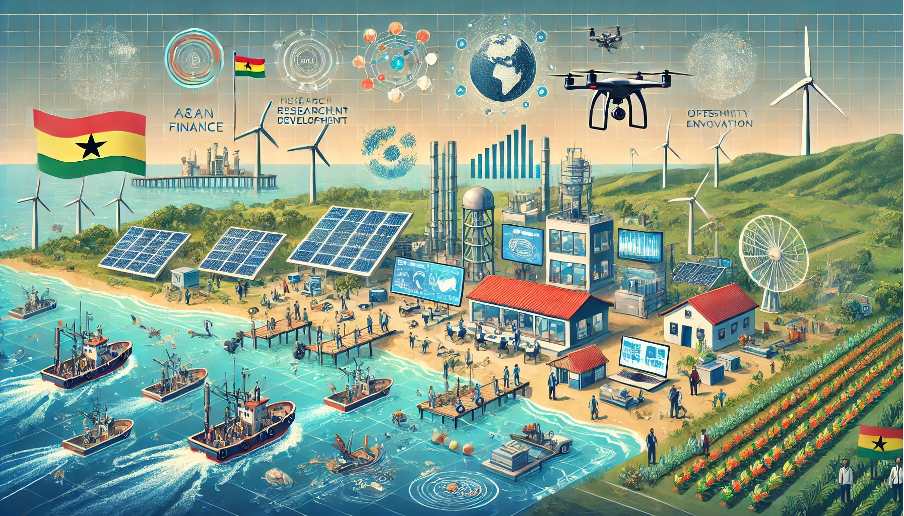
One of the most significant barriers to implementing ocean finance in Ghana is the lack of comprehensive and reliable data on marine ecosystems, resource availability, and economic potential. Without this data, policymakers struggle to design effective strategies for sustainable ocean management.
R&D centres can address this issue by conducting in-depth studies on fish stocks, marine biodiversity, and coastal ecosystems. For instance, Norway’s extensive marine research infrastructure has been instrumental in optimizing fisheries management, generating over $9.2 billion annually from aquaculture alone (Norwegian Directorate of Fisheries, 2023).
In addition to filling data gaps, R&D centres can drive technological innovation. Advanced tools such as artificial intelligence, remote sensing, and blockchain have revolutionised ocean management in countries like the United States and Singapore. AI-powered predictive models, for example, enable the monitoring of fish populations and ecosystem health in real-time, while blockchain technology enhances supply chain transparency in fisheries. Establishing R&D hubs in Ghana can facilitate the adoption of these technologies, positioning the country as a leader in innovative ocean solutions.
R&D also plays a crucial role in attracting international partnerships and funding. Global institutions such as the Green Climate Fund, the African Development Bank, and the Eco-6 Stimulus Fund prioritize projects backed by robust research and data. In demonstrating a strong knowledge base, Ghana can enhance its eligibility for grants and loans to finance Blue Economy initiatives. Seychelles, for instance, leveraged its research capabilities to secure $15 million through blue bonds, funding marine conservation and sustainable fisheries projects (Seychelles Ministry of Finance, 2023).
The benefits of R&D extend beyond economic returns. Research-driven policies can enhance environmental sustainability, ensuring that marine resources are managed responsibly for future generations. For example, studies on the impacts of climate change on coastal ecosystems can inform adaptation strategies, such as mangrove restoration and shoreline protection. These efforts not only mitigate environmental risks but also create opportunities for ecosystem-based tourism and carbon credit schemes.
R&D centres can also foster local capacity-building and talent development. Collaborations with universities and technical institutes can train the next generation of marine scientists, technologists, and policymakers. Countries like Japan have successfully integrated R&D with education, creating a skilled workforce that drives innovation in ocean management (World Bank, 2023). Ghana can adopt a similar approach, ensuring that its Blue Economy initiatives are supported by a pool of local experts.
Building an Ocean Financing Framework for Ghana
To fully harness the potential of ocean finance, Ghana requires a well-structured and comprehensive financing framework. Such a framework must integrate innovative financial instruments, sustainable policies, and strategic partnerships to mobilize resources effectively while ensuring environmental and social sustainability. In aligning with global best practices and tailoring them to Ghana’s unique maritime context, this framework can drive the development of a resilient and thriving Blue Economy.
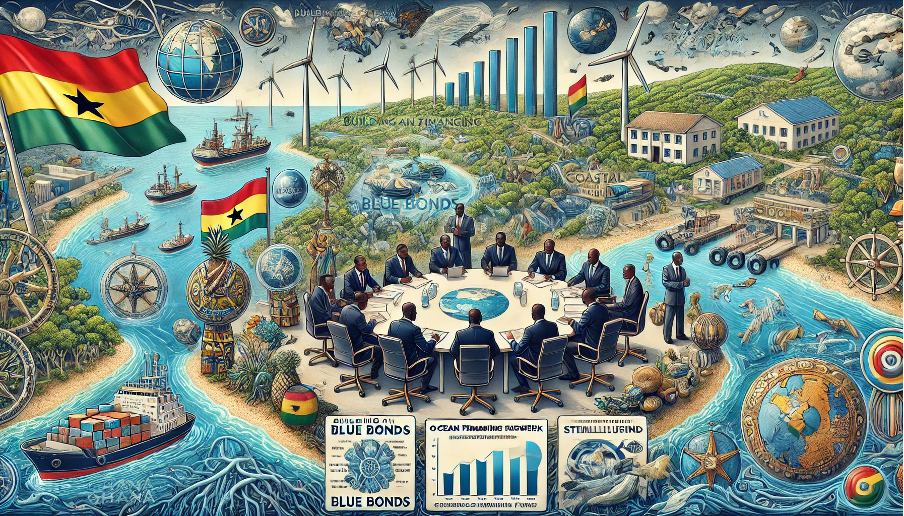
Step 1: Establishing a Clear Policy and Legal Framework
A robust policy foundation is essential for creating an enabling environment for ocean finance. Ghana must establish clear legal frameworks that define the roles of stakeholders, set sustainability standards, and streamline approval processes for ocean-based projects. Policies should prioritize transparency, inclusivity, and equity to attract investments and foster trust among local and international stakeholders. For example, Seychelles’ success with blue bonds was underpinned by clear legal frameworks that ensured accountability and transparency in fund allocation (Seychelles Ministry of Finance, 2023).
Step 2: Leveraging Innovative Financial Instruments
Innovative financial tools such as blue bonds, carbon credits, and Payment for Ecosystem Services (PES) can mobilize significant resources for Ghana’s Blue Economy. Blue bonds, like those issued by Seychelles, can provide funding for marine conservation and sustainable fisheries projects while offering returns to investors. Carbon credits, earned through initiatives like mangrove restoration, can attract funding from global markets, as carbon offset trading gains traction in combating climate change. PES schemes can incentivize coastal communities to protect ecosystems by linking their efforts to direct financial rewards.
Step 3: Establishing Public-Private Partnerships (PPPs)
Public-private partnerships (PPPs) are vital for sharing risks, leveraging private sector expertise, and mobilizing additional resources. Ghana’s maritime logistics sector, for instance, could benefit from PPPs in port modernization and infrastructure development, similar to Singapore’s approach. In collaborating with private entities, the government can scale up projects in renewable energy, sustainable aquaculture, and eco-tourism while ensuring alignment with national development goals.
Step 4: Creating a Dedicated Ocean Fund
A dedicated Ocean Fund can serve as a centralized mechanism for managing resources allocated to Blue Economy projects. This fund should pool resources from government budgetary allocations, international grants, and private investments. The Eco-6 Stimulus Fund, for example, could be a key contributor, offering interest-free grants for ocean-related projects. A transparent governance structure, with stakeholder representation, will ensure that resources are utilized effectively and equitably.
Step 5: Strengthening Local and International Partnerships
Collaborations with international organizations such as the African Development Bank, Green Climate Fund, and UNDP can provide access to funding, technical expertise, and capacity-building opportunities. Regional partnerships within the African Union’s 2050 Africa’s Integrated Maritime Strategy (AIMS) framework can also support transboundary projects, such as combating illegal, unreported, and unregulated (IUU) fishing. At the local level, engaging coastal communities and aligning their traditional knowledge with formal management frameworks can enhance project success and sustainability.
Step 6: Integrating Sustainability and Equity into Financing
All ocean finance initiatives must prioritize sustainability and equity. Environmental safeguards should be embedded into project designs to minimize ecological risks and enhance resilience to climate change. Additionally, financial frameworks should ensure that benefits are equitably distributed, particularly to vulnerable coastal communities that depend on marine resources. Adopting a participatory approach to decision-making can empower these communities and foster long-term project buy-in.
Step 7: Monitoring, Evaluation, and Adaptive Management
To ensure accountability and continuous improvement, Ghana’s ocean financing framework must include robust mechanisms for monitoring, evaluation, and adaptive management. Key performance indicators should track economic, environmental, and social outcomes, with regular reporting to stakeholders. Adaptive management practices will allow Ghana to respond to emerging challenges and opportunities, ensuring the framework remains relevant and effective.
Actionable Recommendations
To implement ocean finance effectively and unlock the potential of Ghana’s Blue Economy, stakeholders must adopt a coordinated and strategic approach. The following recommendations provide clear, actionable steps for policymakers, private sector actors, and communities to ensure sustainable and equitable outcomes.
1. Strengthen Governance and Policy Frameworks
Policymakers must establish robust governance structures that prioritize transparency, accountability, and sustainability. This involves enacting clear policies to regulate ocean finance initiatives and defining the roles of government agencies, private sector stakeholders, and local communities. Regulatory frameworks should also streamline the approval processes for ocean-based projects to attract both domestic and foreign investment.
2. Launch a National Ocean Finance Strategy
The government should develop a comprehensive National Ocean Finance Strategy that aligns with the Sustainable Ocean Plan (SOP). This strategy should identify priority sectors, such as fisheries, renewable energy, maritime logistics, and eco-tourism, and outline specific financing mechanisms to support each. It should also set measurable goals for economic, environmental, and social outcomes to track progress.
3. Mobilize Resources Through Innovative Financial Instruments
Ghana should leverage financial tools such as blue bonds, carbon credits, and Payment for Ecosystem Services (PES) to mobilize resources for ocean-related projects. For instance, issuing blue bonds could provide funding for marine conservation and sustainable fisheries while offering returns to investors. PES schemes can incentivize communities to protect ecosystems, linking their conservation efforts to direct financial rewards.
4. Establish Dedicated Ocean Funds
A dedicated Ocean Fund should be created to centralize and manage resources allocated to the Blue Economy. This fund should pool contributions from government budgetary allocations, international grants, and private investments. Transparent governance and stakeholder representation are critical to ensuring that the fund is utilized effectively and equitably.
5. Foster Public-Private Partnerships (PPPs)
Public-private partnerships (PPPs) are essential for scaling up ocean finance initiatives. The government should collaborate with private entities to drive projects in port modernization, renewable energy, sustainable aquaculture, and eco-tourism. Incentives such as tax breaks and subsidies can attract private sector participation and ensure alignment with national development goals.
6. Invest in Research and Development (R&D)
Establishing R&D centres focused on ocean management is crucial for enhancing Ghana’s knowledge base and attracting international partnerships. These centres can conduct studies on fish stocks, marine biodiversity, and coastal ecosystems, providing data to support evidence-based policymaking. R&D can also drive technological innovation, such as AI-powered monitoring systems and blockchain-based supply chain solutions.
7. Engage Coastal Communities
Local communities must be at the heart of ocean finance initiatives. Policymakers and project implementers should actively involve coastal residents in decision-making processes to ensure their needs and perspectives are addressed. Training programs and capacity-building initiatives can empower communities to manage resources sustainably and benefit from Blue Economy projects.
8. Build International and Regional Partnerships
Ghana should deepen its engagement with international organizations, such as the African Development Bank, Green Climate Fund, and UNDP, to access funding and technical expertise. Regional collaboration under the African Union’s 2050 Africa’s Integrated Maritime Strategy (AIMS) can address transboundary issues like illegal fishing and pollution. Partnerships with global leaders in ocean finance, such as Seychelles and Norway, can also provide valuable insights.
9. Integrate Climate Adaptation into Ocean Finance
Ocean finance must address the impacts of climate change on marine ecosystems and coastal communities. Projects should incorporate climate adaptation measures, such as mangrove restoration, shoreline protection, and renewable energy development. These initiatives not only mitigate environmental risks but also create economic opportunities through ecosystem-based tourism and carbon credit schemes.
10. Monitor, Evaluate, and Adapt
A robust monitoring and evaluation framework is essential to track the progress of ocean finance initiatives and ensure accountability. Key performance indicators should measure economic, environmental, and social outcomes. Adaptive management practices will allow stakeholders to respond to emerging challenges and opportunities, ensuring the long-term success of ocean finance projects.
Conclusion
Ghana stands at a pivotal moment in its economic journey, grappling with challenges that demand bold, innovative, and sustainable solutions. Ocean finance represents more than an opportunity—it is a lifeline to economic renewal, environmental preservation, and national resilience. In harnessing the untapped potential of its Blue Economy, Ghana can chart a new course, one that addresses its pressing financial woes while laying the foundation for a future of shared prosperity.
The actionable recommendations outlined—spanning innovative financing mechanisms, strategic public-private partnerships, robust research and development, and inclusive governance—offer a roadmap to transform Ghana’s maritime resources into a cornerstone of economic recovery. Implementing these strategies will not only create jobs and generate significant revenue but also position Ghana as a regional leader in sustainable ocean management, inspiring neighbouring nations to follow suit.
The stakes are high, but so too is the promise of what can be achieved. With a coastline that stretches across opportunity and a maritime zone brimming with potential, Ghana’s oceans hold the solutions to its debt crisis, energy challenges, and environmental vulnerabilities. These waters, when managed with vision and commitment, can become engines of economic growth and pillars of environmental resilience.
The time to act is now. Ghana’s Blue Economy is not just a strategy; it is a profound commitment to building a future where the seas provide security, innovation fuels progress, and sustainability underpins every decision. The path forward is clear, and with decisive leadership and collective action, Ghana’s oceans will no longer symbolise untapped potential—they will become the wellspring of a brighter, more sustainable future for generations to come.
*******
Dr. David King Boison, Senior Research Fellow at the Center for International Maritime Affairs Ghana (CIMAG), is a distinguished academic, consultant, and CEO of Knowledge Web Centre, specializing in Blue Economy, Maritime and Port Operations & Logistics, IT, supply chain management, and Artificial Intelligence. With dual PhDs in Port Operations and Business Administration and two MSc degrees with distinction from Coventry University, he is the Lead Consultant for the Ai Africa Project, which aims to train 11 million Africans in AI technologies. A Senior Visiting Lecturer at Wigwe University, Rivers State, Nigeria, he is also recognized for pioneering Ghana's e-port system (now the Paperless Port System). He has authored numerous peer-reviewed papers and white papers on the Blue Economy, maritime trade & Port Operations, AI, fintech, and digital currencies, and has written two books.
Latest Stories
-
Ghana is rising again – Mahama declares
5 hours -
Firefighters subdue blaze at Accra’s Tudu, officials warn of busy fire season ahead
5 hours -
New Year’s Luv FM Family Party in the park ends in grand style at Rattray park
5 hours -
Mahama targets digital schools, universal healthcare, and food self-sufficiency in 2026
5 hours -
Ghana’s global image boosted by our world-acclaimed reset agenda – Mahama
6 hours -
Full text: Mahama’s New Year message to the nation
6 hours -
The foundation is laid; now we accelerate and expand in 2026 – Mahama
6 hours -
There is no NPP, CPP nor NDC Ghana, only one Ghana – Mahama
6 hours -
Eduwatch praises education financing gains but warns delays, teacher gaps could derail reforms
6 hours -
Kusaal Wikimedians take local language online in 14-day digital campaign
7 hours -
Stop interfering in each other’s roles – Bole-Bamboi MP appeals to traditional rulers for peace
7 hours -
Playback: President Mahama addresses the nation in New Year message
8 hours -
Industrial and Commercial Workers’ Union call for strong work ethics, economic participation in 2026 new year message
10 hours -
Crossover Joy: Churches in Ghana welcome 2026 with fire and faith
10 hours -
Traffic chaos on Accra–Kumasi Highway leaves hundreds stranded as diversions gridlock
10 hours

